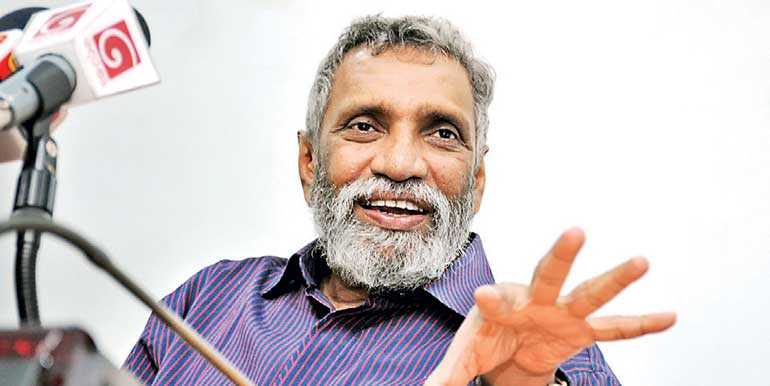Saturday Feb 14, 2026
Saturday Feb 14, 2026
Tuesday, 5 May 2020 00:27 - - {{hitsCtrl.values.hits}}

Election Commission Chairman Mahinda Deshapriya
The Election Commission has announced that it shall conduct the General Election on 20 June. Over the media, politicians, journalists, and lawyer-politicians have defended that decision by providing inaccurate interpretations of certain constitutional provisions.
I do not claim infallibility, but the relevant provisions of the Constitution have been stated in such clear terms that their meaning should be obvious to all except those who view it through politically-tainted lenses.
The Constitution is the supreme law
The Constitution is our supreme law. It means that every other law should be read subject to the provisions of the Constitution. No legislative, executive or administrative act can override the Constitution. No power vested in any person or body by the Constitution can be exercised by any other person or body.
Dissolution of Parliament
There are three procedures leading to the dissolution of Parliament. The first is when two-thirds of all the Members of Parliament pass a resolution requesting the President to dissolve Parliament. Such a resolution may be passed at any time. The second is when the President decides to dissolve Parliament, but only during the last six months of its five-year term. The third is when the five-year term of Parliament ends.
Article 70(5) of the Constitution states that Parliament may be dissolved by a Proclamation issued by the President. That Proclamation must (a) fix a date or dates for the election of Members of the next Parliament; and (b) summon the new Parliament to meet on a date not later than three months after the date of such Proclamation.
Similarly, when Parliament stands dissolved upon completing its full term of five years, the President is required to forthwith issue a Proclamation (a) fixing a date or dates for the election of Members of the next Parliament; and (b) summon the new Parliament to meet on a date not later than three months after the date of such Proclamation.
Therefore, it is the President, and the President alone, who is vested with the power to fix the date or dates of a General Election. That power cannot be usurped by any other person or body. Nor can that power be delegated by the President to any other person or body. It is equally evident that, upon dissolution, the new Parliament must be summoned to meet within three months of the date of the Proclamation. Thus, the Constitution ensures that the maximum period that the country may be governed without a Parliament is three months.
The Election Commission
The Constitution has established an Election Commission consisting of a chairman and two other members. It is an independent body whose object is “to conduct free and fair elections”. Its duty is “to secure the enforcement of all laws relating to the holding of elections”.
The law relating to Parliamentary Elections is set out in the Parliamentary Elections Act, No.1 of 1981. That Act addresses issues such as the registration of electors, the nomination of candidates, the appointment of returning officers and other staff, the recognition of political parties and the allocation of symbols, etc.
Proclamation of 2 March
On 2 March, the President issued a Proclamation under Article 70(5) of the Constitution dissolving Parliament, six months before its term was due to end. In that proclamation, he fixed 25 April as the date for the election of Members of Parliament, and 14 May as the date of the first meeting of the new Parliament.
In terms of the Interpretation Ordinance, the President is entitled to amend, vary, rescind or revoke the Proclamation issued by him. Therefore, the President may, at any time, change the date of the general election and/or of the first meeting of the new Parliament, so long as the latter is within the period of three months of the date of the Proclamation (i.e. 2 June). The President has, so far, not chosen to do so.
New date for the General Election
The Election Commission, purporting to act under section 24(3) of the Parliamentary Elections Act, has published an order fixing 20 June as the date for the general election of Members of Parliament, overriding the date fixed in the Proclamation issued by the President.
The Commission has, in so doing, not only arrogated to itself a power vested in the President by the Constitution, but has, in effect, also amended or varied the Proclamation issued by the President under Article 70(5); a power which only the President possesses, and which the Constitution has not conferred on the Election Commission or on anyone else.
Section 24(3) of the Presidential Elections Act, under which the Commission has purported to act, states that “where due to any emergency or unforeseen circumstances, the poll for the election in any electoral district cannot be taken on the day specified”, the Election Commission may, by Order published in the Gazette, “appoint another day for the taking of such poll”.
This section contemplates a situation where, as the date fixed by the President for the general election approaches, it becomes evident that, due to any emergency or unforeseen circumstances such as heavy rainfall or a widespread flood, it is impractical to conduct a poll in a particular electoral district. The Commission may thereupon fix another date for that purpose.
This is a limited power, confined to an electoral district, and cannot be utilised to override the date for the general election fixed by the President in his Proclamation issued under Article 70(5) of the Constitution. This is clearly evident from the consequences of that action.
Five questions
As a citizen of this country, and as a registered voter, it is appropriate to ask the Election Commission to answer the following questions:
1. When the President issued his Proclamation on 2 March, the World Health Organization had four days previously described the novel coronavirus as “a public health emergency of international concern”. On 16 March, when the Commission commenced accepting nominations, the World Health Organization had five days earlier proclaimed COVID-19 as a “pandemic”, i.e. a global spread of a new disease. Since the Commission apparently did not consider either of these developments as constituting “unforeseen circumstances”, what were the “unforeseen circumstances” that subsequently arose which led the Commission to believe it could act under section 24(3)?
2. The Commission is no doubt aware that under Article 70(7) of the Constitution, if at any time after the dissolution of Parliament, the President is satisfied that an “emergency” has arisen of such a nature that an earlier meeting of Parliament is necessary, he may by Proclamation summon the Parliament which has been dissolved, and such Parliament shall stand dissolved upon the termination of the “emergency” or the conclusion of the General Election, whichever is earlier. The President apparently does not consider that such an “emergency” has arisen and has therefore not acted under that Article. What, then, is the “emergency” that the Commission is aware of and which led the Commission to believe that it could act under section 24(3)?
3. Does the Commission seriously believe that a power conferred on it by ordinary legislation to postpone a poll in a particular electoral district owing to an emergency or unforeseen circumstances can be expanded and elevated to constitutional status to enable it to determine the date of the General Election, and thereby usurp a constitutional power vested only in the President of the Republic?
4. Having changed the date of the general election to 20th June, when does the Commission expect the new Parliament to meet? Does the Commission intend to summon the new Parliament, and if so, by what authority? The Commission is no doubt aware that the President has, by Proclamation, summoned the new Parliament to meet on 14 May, and that any new date he may proclaim is required by the Constitution to be before 2 June.
5. Is the Commission not aware that the Proclamation issued by the President on 2 March will lapse on the expiry of three months from the date of its issue? It has no life beyond that date. If a General Election has not been conducted, and if a new Parliament has not met by 2 June, the immediate consequence will be that the dissolution of the 2015 Parliament, ordered by that Proclamation, will be rendered of no force or effect in law, especially since its five-year term ends only on 1 September. Therefore, when that Parliament is still in existence on 20 June, how can the Commission conduct a General Election? An existing Parliament must be dissolved before the new Parliament is elected.
Conclusions
The only action that was taken in pursuance of the Proclamation issued by the President on 2 March was the acceptance by the Election Commission of nominations submitted by political parties and independent groups for the 22 electoral districts.
If it is the wish of the political parties represented in Parliament that the nominations submitted in March should be retained, and that they should not be required to repeat the process again whenever the General Election is held later this year, a simple amendment to the Parliamentary Elections Act will secure that objective.
It would be ill-advised to conduct polling in 22 electoral districts in the midst of a pandemic. Nor does social distancing appear to be a feasible option if Parliament convenes with its 225 members, stenographers, Hansard reporters, supporting staff and security officers.
The procedure adopted by the United Kingdom Parliament where only a small number of members representing the different parties enter the chamber, while others participate through video conference is an option worthy of consideration. However, the situation prevailing in the country today may well justify the prorogation of Parliament for the next two months, after essential business has been completed.